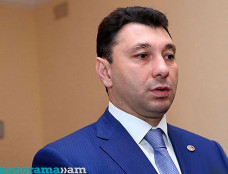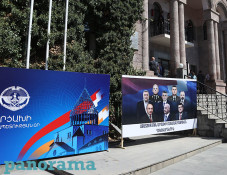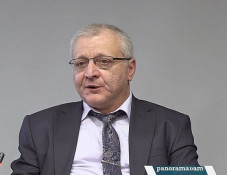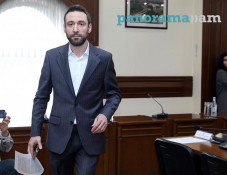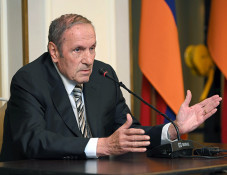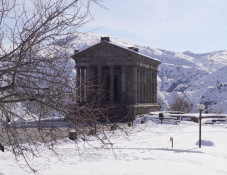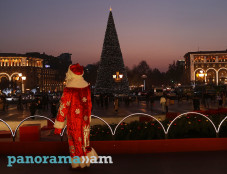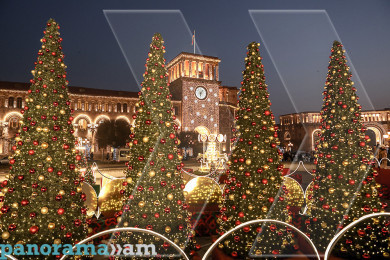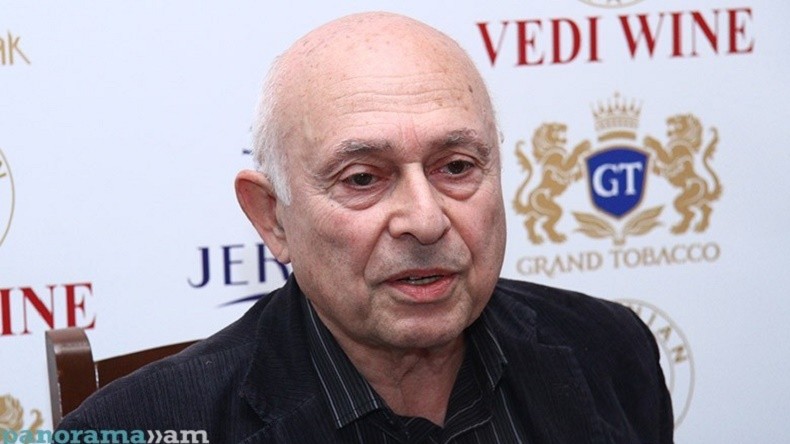
Rouben Galichian: Name Hayastan, Armenia or Ermeniye can be seen practically on all European and Islamic medieval maps
The oldest objects bearing a resemblance to some sort of map are boundary lines of habitations and rivers in form of petroglyphs discovered in Denmark, France, Italy, Russia, Armenia and elsewhere. Maps therefore in some sort of shape and form have existed since before the Bronze Age—some drawn on clay tablets have been dated as being 8,000 years old —while, to our knowledge, carved or written text of any sort first appeared only several millennia later, writes famous cartographer Rouben Galichian in his book Historical and Geographical Falsifications of Azerbaijan, a historical, cultural and cartographical research based on a detailed analysis backed by documentary evidence.
By definition, a map cannot intentionally lie or convey incorrect information. But of course this is applicable only in the case of physical, topographic, hydrographic or similar maps, where the cartographers put in their best efforts to present the truth as closely as possible and as known. When it comes to political maps, which include country names and boundaries, the matter becomes more complicated. In some cases, such maps are drawn to convey propaganda messages or are made to serve the aims of political leaders. The results, instead of showing the truth is to distort it, Galichian writes.
“The Earth’s topography, hydrography, oceanography and geography have changed little over the past millennia while the maps representing them have been gradually improved and become more complete. The changes that are evident in the Earth’s features are due mainly to the destructive attitude of mankind and their disregard of the natural environment, examples being the destruction of the rainforests and the drying up of seas such as the Caspian and Aral as well as lakes like Sevan and Urmia,” he notes.
Since maps could be compared with the real state of affairs, cartographers try to present them in the most truthful manner. Up to the 14-15th centuries, maps with a few exceptions generally excluded the artificially imposed and often volatile political boundaries, and on any given region, only the names of the countries and the indigenous peoples were shown, according to Galichian’s research.
As an example of the presence of the names of the peoples living in a given region and lack of boundaries, Galichian cites the occurrence of the name of Armenia in medieval and modern maps. Even after losing its independence, the name Hayastan, Armenia or Ermeniye can be seen on all the European and Islamic maps of the region since this represented the region where the Armenian peoples have always lived. This covered the approximate area from Lake Van to Urmia and from Diyarbakir to Lori.
In the appendix of the book, Galichian presents an Ottoman Turkish map of 1803, where over the region of Lake Van and Erzrum the legend specifies ‘Ermeniye’ (‘Armenia’), with ‘Kurdistan’ being noted to the south of it. “This tradition continued in western cartography until 1925 and sometimes even beyond, after which in order to appease Turkey and because of the ethnic cleansing already perpetrated during the World War and the Genocide of 1915, the name of Armenia was dropped from European and American maps,” he highlights.
Next, Galichian notes the informational and scientific value of travelogues, where the authors describe the reality and events they saw, experienced and witnessed rather than the events of distant or recent past. “Travellers and explorers’ writings are, of course, composed under the influence of personal taste, religious and social convictions and viewpoints, and yet, taken the right way, they are reliable and complementary and thus can be used as true geographical observations,” he notes.
To conclude, Galichian notes that the maps created by the third party, that is, foreigners, as well as travellers’ writings with information about the described country can also be regarded as documents reflecting the reality relatively accurately, and sometimes even more reliable than the information provided in solely historiographic writings.
To be continued.
Born in Tabriz, Rouben Galichian is a descendant of refugees from Van who survived the Genocide. He received scholarship and studied engineering at Aston University, Birmingham (UK). Since in 1981, he started to study the rich cartographical heritage in the libraries of the UK and other European countries. His first research, Historic Maps of Armenia (in English), was published in 2004. It was a collection of maps from various libraries and museums in the world, where Armenia was noted, beginning from the 6th century to the present times. His second book, Armenia in World Cartography, was published in Yerevan in 2005. The research ‘Countries South of the Caucasus in Medieval Maps. Armenia, Georgia and Azerbaijan’ (in English and Armenian) was published in 2007. The book The Invention of History (in English) was published in 2009.
In his book Historical and Geographical Falsifications of Azerbaijan, published in 2013, the author details the reasons, aims and methodology of the falsification of the history of Azerbaijan and the countries of the region.
Related news
- Rouben Galichian displays Azerbaijanis appropriating written culture and famous individuals of neighbouring peoples
- Rouben Galichian references Medieval Christian travellers and chroniclers’ evidence on Armenian presence in Caucasus
- Rouben Galichian exposes Azerbaijani scholars’ falsifications of their own sources about Armenia and Armenians
- Rouben Galichian references C9-14th Islamic sources about Armenia and Armenians
- Rouben Galichian compiles evidence on Armenian presence in Caucasus from Greco-Roman sources of C5-1 BC
- Rouben Galichian refutes Azerbaijani theory about ‘Armenians being newcomers’ to South Caucasus
Newsfeed
Videos









